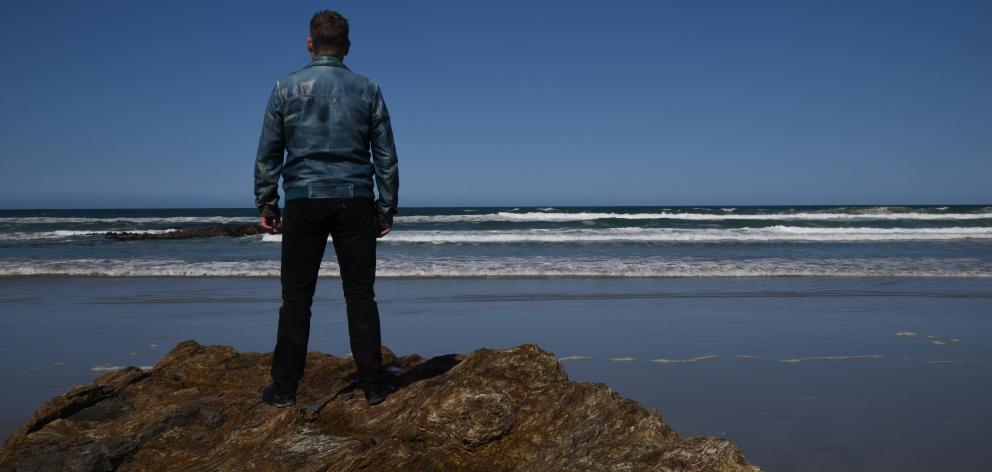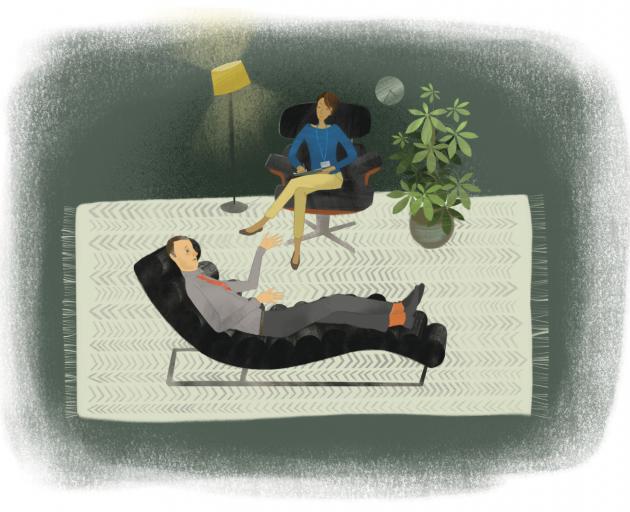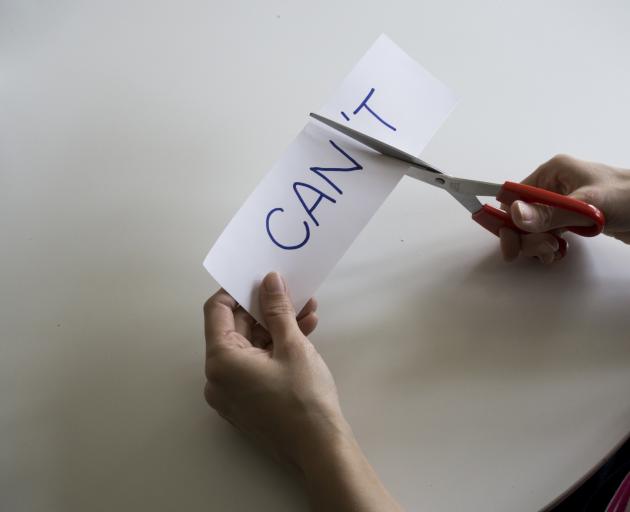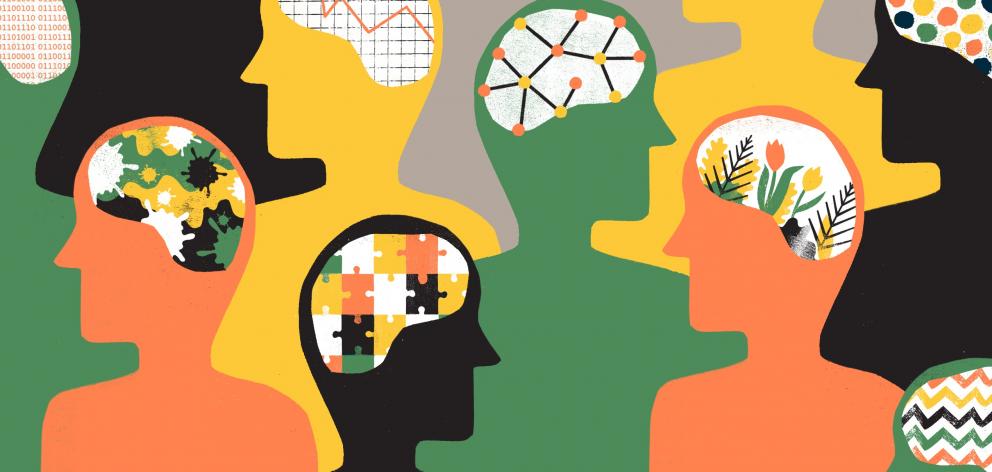
Life was a living hell, writes Bruce Munro of his fight with anxiety and depression. But that was only the beginning of the award-winning journalist's arduous, ongoing, sometimes funny and ultimately rewarding road to recovery.
I vividly recall the moment I thought I had gone mad.
Minutes before, I had phoned the Dunedin Central Police station to alert them to an email threatening violence against the Prime Minister.
Now, I was sitting at my newspaper office desk waiting for the police to arrive, wondering whether I had made it all up.
Panic, which had become a constant cruel companion, hugged me tight.
Cold sweat soaked my armpits. My head spun. I gripped the underside of the workstation, fighting to extract one objective thought from a terrified, fog-filled brain.
Maybe this illogical, gnawing fear, which I was desperate to keep secret, was a sign I was losing my mind. Maybe I had already stepped over the edge. Maybe the email did not exist at all. Maybe the police were on their way to cart me off.
That was 10 years ago, this month.
That year, 2008, was a colossus. Sir Edmund Hillary died. China hosted the 24th Summer Olympic Games. The Global Financial Crunch hit and the Great Recession began. Helen Clark was toppled by John Key.
I was a few months back into a reporting job at The Star community paper in Dunedin. After a three-year diversion that ended messily, I had scampered back to journalism, tail between my legs.
The fear had built in waves during the previous 18 months.
The first couple of instalments, months apart, were a curiosity to me as someone who enjoyed the pace and pressure of news media, was an experienced public speaker, an idealist, a risk-taker, a husband and busy father of four fabulous kids.
Yes, there had always been some inner tension, some underlying dis-ease. But that was ankle deep, whereas this was threatening to submerge me.
By October, as each successive wave mounted with shorter intervals, fear of the fear took hold.
It is this panic that the panic will overwhelm and expose you, that is the deep demon of anxiety disorders.
The years 2008 to 2010 were a living hell.
Days were spent fighting panic at every conversation, every ring of the phone, every effort to find an angle and construct a story. Nights were worse. I often woke at about 3am, adrift in a sea of unfathomable dread.
I never wanted to kill myself, but the idea of no longer existing seemed sweet relief.
It was horrific - yet unremarkable.

ANXIETY and depression are a plague on Western society, especially New Zealand. It is only getting worse, becoming decidedly common.
About 17% of New Zealanders have been diagnosed with depression, anxiety, bipolar disorder or a bitter cocktail of the above, at some point in their lives. During the next 12 months, 228,000 Kiwis are predicted to experience a major depressive disorder. Globally, the World Health Organisation believes mental illness will become the second leading cause of disability within two years.
Garden variety, moderate-to-acute anxiety and depression. Myriad indistinguishable, panicked snails sliming their tortured way across a seemingly endless salt pan.
Ten years ago, Sir John Kirwan was still blazing the honesty trail, getting Kiwis to talk about it.
As anxiety flared in my brain, I got the opportunity to interview him, by phone, in Japan, where he was coaching that country's national rugby team.
The conversation was to be wide-ranging, allowing my desperate, secret question to be asked,"Does the anxiety go away and never return?''.
"That's not the point,'' he replied.
The point, was that there was always a positive step one could take to get to a better place.
With hindsight, he was right. At the time, however, it left me comfortless, still nursing my awful, hidden reality.
It is pleasing, and important, that we now hear more voices owning their experience of mental illness.
What we do not hear so much about, is the process of recovery. The long, difficult, but decidedly do-able road back to our old selves and, hopefully, eventually, to somewhere even better.
For me, the secret of my mental ill-health was the first prison that had to go.
FOR what seemed like an eternity, I had been locked in a state of anxiety about my anxiety, ever fearful that the next moment would be overwhelming, without an understanding of what was happening but unable to access that information for fear that telling anyone would only confirm I was indeed an inadequate failure.

I wish I had sought help at the first flushes of panic. But I can dig in like nobody's business. I endured two years before the torment forced my hand.
"You're not going mad. And I can tell you, you will get better.'' A soothing ointment, a lifeline, from a wise, kind counsellor, a woman in her 70s with decades of experience, after she had heard me out.
Reaching out was the beginning. But there was so much ground to recover.
Once, I had enjoyed asking difficult, probing questions. Now, each time I lifted the telephone receiver, intense anxiety flooded me.
In the past, I had scaled scaffolding to the top of the Dunedin Railway Station clocktower. Now, walking down a flight of stairs made my head swim.
At home, once passionate, witty and adventurous, I was reduced to an automaton. (Those closest to me paid a price. That is my one true remaining regret.)
The worst part of each week was Thursday morning planning meetings at a local cafe. I was a competent, capable journalist, but performance and social anxiety reduced me to stony faced, clipped phrases as I clung to the underside of the table, fighting the urge to bolt from the building.
At the bottom of it all, of course, there lay baggage.
Childhood insecurity; followed by almost two decades of theoretical belief that I was loved, that I was OK, was belied by strenuous efforts to get significance and approval from others; and, then a series of events that washed away the wobbly pillars of my house.
All that was left was a largely theoretical foundation.
We all need an immovable bedrock. For some it is themselves. For others, their reasoning, the Universe, Elvis . . . Mine became God, in practice, not just in theory.
Some would say that should be enough, everything.
Reality is, while I now truly knew for the first time that it was OK, would be OK, no matter what, a fear process had established itself in my brain.
For several years, my brain had been building an extensive back catalogue of experiences it interpreted as fearful. A mind loop was set up. The amygdala, the almond-sized primal brain, detected a threat. A flood of adrenaline and cortisol was released, creating a hyper-attentive state. The neocortex scanned memories for explanations of this arousal. If what was going on, no matter how mundane - a phone ringing, having a conversation, driving across a bridge - had been labelled "fearful'' by a past experience, then fear was offered to my conscious brain as the appropriate emotion.
Deep ruts were created that ran directly from any stimuli (past, present and future) to a fear response.
By simple, tragic repetition, I had trained my thinking to be scared of virtually everything.
And it had layers. Boy, did it have layers.
Imagine reaching for the phone. Try panicking about how the person will respond; the possibility they will be angry or fearful. Add sudden consternation that you might freeze and be unable to explain yourself. Run a system scan to assess how panicked you are. Panic about that. Also try to gauge how anyone within earshot might be reacting to your phone manner and catastrophise your possible involuntary reaction to their undoubted scorn. Do all the above at the same time.
I concluded I would have to be content with years of re-wiring.

Shaun Robinson, chief executive of the Mental Health Foundation, says New Zealand has a smorgasbord of treatment options for mental health and addiction issues. He cites therapeutic, peer support, kaupapa Maori, physical exercise, psycho-educational and community support approaches.
He says that during the 2016-2017 year, 1.5 million individual treatment sessions were provided.
I sought skills wherever I could find them. Cognitive Behavioural Therapy, Mindfulness, Acceptance Commitment Therapy ... For five or six years, I was a serial, therapy monogamist, diligently squeezing one approach dry and then moving on to the next.
Giving my terrified mind time out was an important early tool.
There is a toilet cubicle on the second floor of the ODT building in Dunedin that has a simple but beautiful, early 20th-century geared locking mechanism. For a couple of years, three or four times a day, I would slide it shut, slump against the wall and, with my eyes shut, imagine my body floating in a tropical island lagoon. Then, two or three minutes later, I would go back down the hall and carry on with whatever article I was working on.
For years, I carried scraps of paper in my pockets; affirmations I would pull out and read on my way to interviews or whenever there was a quiet moment.
Many of these affirmations had started as moments of night-time terror. I learnt to not just lie there in a pool of cold sweat but to go sit in the lounge under a small pool of lamp light and, with pen and paper, identify and own the fear. Then I'd write down what logic told me about that feared scenario. Next came advice to myself about how to think about the situation. Lastly, I summarised it in a few concise affirmations, tore it off the sheet and carried it around for several weeks until I felt it was getting through, creating a new pathway in my mind.

There were a couple of tricks that I haven't seen in any texts on anxiety. Like, yelling.
I wanted a faster way to get reality through to my subconscious.
So I tried yelling, as loud as I could, a bunch of statements about what I believed to be true about myself and my life.
And it worked. I remember returning to the office and having a whole glorious afternoon almost free of mind-fog. It did not work so well the next time, but I knew it was helping.
So, I started yelling, every morning, while driving to work.
I tried not to yell while following or driving towards other traffic. But it wasn't always possible.
If, a few years back, you were thrown by the sight of someone apparently, inaudibly (I hope) and unaccountably yelling at you from their car, I apologise, to all of you. It really was doing me some good.
Another place I yelled was at the beach. Once a month, on a beautiful, isolated stretch of sand between Brighton and Taieri Mouth, I let it all hang out. Whatever wanted to come to the surface was allowed to, then examined and dealt with. A lot of abuse, and forgiveness, was meted out on that stomping ground.
The time spent alone with nature, observing its rhythms and truths, taught some valuable life lessons. Lessons I turned into a possibly unforgivable piece of performance poetry.
The other magic trick was massage.
When your fear is stored as tension in your body, and awareness of that only adds to your worry, a good 25-minute, $30, deep-tissue massage at the local mall can seem as beneficial as a 50-minute, $175 session with a highly qualified psychologist. There's a PhD in that, right there.
I still get neck and shoulder massages once a month.

FOR some, what's needed to improve mental health is more fundamental than a good counsellor and a soundproof car.
Robinson agrees New Zealand needs increased access to free or heavily-subsidised therapies and supports, "so that help is accessible and affordable for all''. But, he also emphasises that the country needs a high-level mental health action plan that will reduce the "social drivers'' of poor mental health.
I didn't take medication. I would like to have. But every time I got close, I pulled back, knowing the pain was keeping me pushing forward and that psychotherapy, if applied consistently, promised lasting results.
In 2012, in this limping fashion, I was named joint winner of the Community Newspaper Association of New Zealand's Best Journalist award.
That same year, I was appointed news feature writer at the Otago Daily Times.
Since then, I've twice been a finalist in national media competitions. This year, the ODT's weekend magazine The Weeekend Mix, which you are reading, was named the best newspaper inserted magazine in the country. I add these boasts simply to underscore the point that mental distress does not mean you're only good for the scrap heap.
It is important to realise the recovery process is not smooth, or as Robinson puts it, "not linear''.
"There can often be set-backs and triumphs along the way,'' he says.
"What's important is that people have good support from whanau, friends and health professionals.''
Two steps forward, one back. In the middle of this crazy little rhumba, however, it often seemed the order was reversed.
The new job felt like a huge step forward. A year later, however, my 20-plus-year marriage had stalled and died. It was a greater tragedy than the disruption that had triggered the original panic attacks. But, I now had an expanding anxiety toolkit. It did not sink me. In fact, I grew.
As they remind each other at AA meetings (presumably plagiarising the advice on packets of laxatives), the reality is always that "this too shall pass''.
Deliberately retaking the ground I had ceded to anxiety was crucial.
Joining Toastmasters; taking up Tai Chi; returning to church; swimming and cycling; initiating a regular curry, beer and pool night with an eclectic bunch of old and new mates - they were all calculated ways of giving fear the middle finger.
One autumn, when I had not talked to a counsellor for at least a year, the anxiety suddenly surged.
Two sessions with a psychologist and a book on mindfulness later, I was back on the path.
Learning to live in the present - the ordinary, mundane moment - rather than living in an ever-looming catastrophe inside your head, is a wonderful skill.
Almost exactly a year later, it happened again. Back to the psychologist, a new set of tools to begin applying and away I went again.
Each new stage felt like being on a circus trapeze. In order to lay hold of the new freedom proffered, it was necessary to let go of something that was giving security right now. In doing so, there were always those scary moments when I was holding neither, in freefall.
For instance, learning to not worry about being worried.
Growing up, being able to imagine what might go wrong and prepare myself for it, was a coping mechanism. As an adult in the grip of anxiety, capturing those anxious thoughts and replacing them with truer, more positive, ones had been an important, almost fulltime job. Being confronted with the idea that paying close attention to the anxiety was counterproductive seemed almost sacrilege.

Telling a worrier it is important (and therefore requiring worry) that they don't worry, is a serious discombobulator.
Dismissing the anxiety with "Oh, just that again. That's nothing to worry about'' was a significant leap of faith.
The third autumn, before my old seasonal affective friend could revisit, I met someone new.
Love is the opposite of fear. It gives energy, directs the focus outwards and encourages all sorts of healthy risk-taking. My world expanded. I felt better than I had in years.
We've been married 18 months.
It's Wednesday afternoon. I'm sitting at my desk, typing these concluding paragraphs. Around me are good journalists, good people, busy at their work.
A decade after the first panic attacks, I'd say that by most measures I'm 80% to 90% back. I have wrested my body and mind from fear. I have skills to manage the residual, low level anxiety.
I still want to make headway - some situations in the newsroom continue to unduly concern me and I'd like to ride a rollercoaster again. But I am once again able to freely, gloriously, lose myself in the journalistic process of thinking, investigating, writing. Last month, a friend and I spent 90 minutes with the Highlanders rugby team leadership group, outlining findings and strategies from a book we co-authored - something that would have been unthinkable for me three years ago.
By other, perhaps more important measures, it's probably 150%.
The boy that never felt at peace can now sit still, inside and out, genuinely enjoying a sunset.
The drive to be acknowledged, to have my value constantly validated, has been replaced by a freedom that increasingly doesn't give a toss and so is able to more truly give, care and love.
Without the mental distress, I doubt I would have got there. I'm grateful.
What about you?
On the cusp of Mental Health Awareness Week, how are you going?
If you are secretly anxious, depressed, manic or addicted, talk to someone. Get good help. There is hope.
If you are on the recovery journey, good on you. Keep going. Life can be good.
If you've never experienced any of this, thanks for reading. Be thankful. Be kind.

Getting our heads around mental health
• Mental Health Awareness Week, October 8 to 14
This year's theme is Let Nature In _ Strengthen Your Wellbeing. For more information on what is happening in Otago, visit www.mhaw.nz/whats-on/otago.
• Mental Health and Wellbeing Survey
This is the third annual survey by the Health Promotion Agency examining New Zealanders' views and experiences relating to mental health. Some of the results will be released online by the end of the year; www.hpa.org.nz.
• Government Inquiry into Mental Health and Addiction
The Inquiry was set up to identify needs and make recommendations for a better mental health and addiction system for New Zealand. More than 2000 people attended 26 regional meetings. About 5500 submissions were received. The inquiry panel will deliver its report to Government this month.
Asking for help
• Need to talk? 1737, free 24/7 phone and text number
• Healthline: 0800 611-116
• Lifeline Aotearoa: 0800 543-354
• Suicide Crisis Helpline: 0508 828-865 (0508 TAUTOKO)
• Samaritans: 0800 726-666
• Alcohol Drug Helpline: 0800 787-797
• General mental health inquiries: 0800 443-366
• The Depression Helpline: 0800 111-757
• Youthline: 0800 376-633, txt 234 or talk@youthline.co.nz
Comments
Nobody who experiences panic that there may be a panic attack, so there is one, can be flippant about depression/anxiety, but there is a comfort in the blackest of humor. Such as, in certain occupations, you're onto a winner if your behaviour increases the audience ratings.
Good on you.












